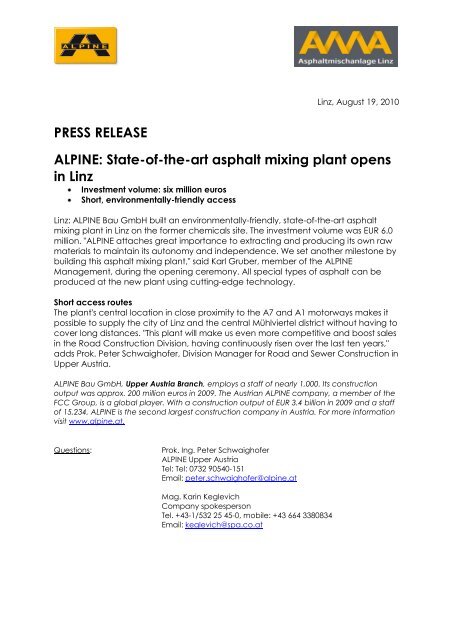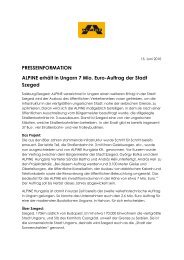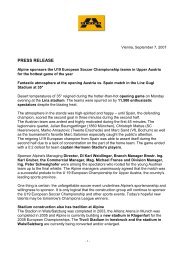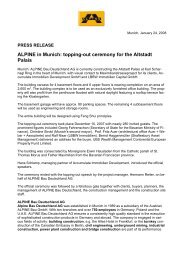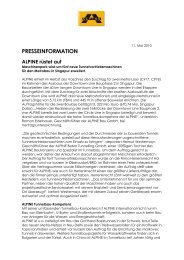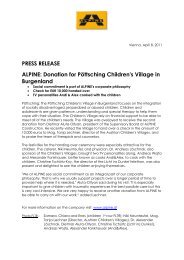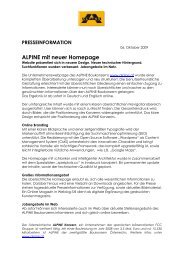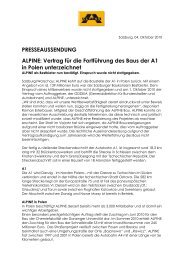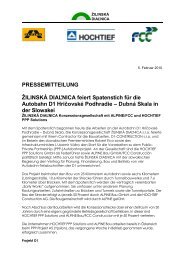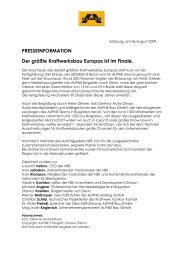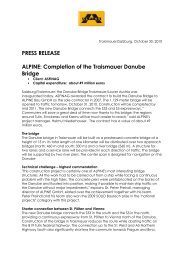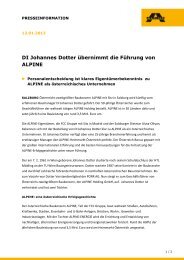State-of-the-art asphalt mixing plant - ALPINE Bau Gmbh
State-of-the-art asphalt mixing plant - ALPINE Bau Gmbh
State-of-the-art asphalt mixing plant - ALPINE Bau Gmbh
You also want an ePaper? Increase the reach of your titles
YUMPU automatically turns print PDFs into web optimized ePapers that Google loves.
PRESS RELEASE<br />
Linz, August 19, 2010<br />
<strong>ALPINE</strong>: <strong>State</strong>-<strong>of</strong>-<strong>the</strong>-<strong>art</strong> <strong>asphalt</strong> <strong>mixing</strong> <strong>plant</strong> opens<br />
in Linz<br />
Investment volume: six million euros<br />
Short, environmentally-friendly access<br />
Linz: <strong>ALPINE</strong> <strong>Bau</strong> GmbH built an environmentally-friendly, state-<strong>of</strong>-<strong>the</strong>-<strong>art</strong> <strong>asphalt</strong><br />
<strong>mixing</strong> <strong>plant</strong> in Linz on <strong>the</strong> former chemicals site. The investment volume was EUR 6.0<br />
million. "<strong>ALPINE</strong> attaches great importance to extracting and producing its own raw<br />
materials to maintain its autonomy and independence. We set ano<strong>the</strong>r milestone by<br />
building this <strong>asphalt</strong> <strong>mixing</strong> <strong>plant</strong>," said Karl Gruber, member <strong>of</strong> <strong>the</strong> <strong>ALPINE</strong><br />
Management, during <strong>the</strong> opening ceremony. All special types <strong>of</strong> <strong>asphalt</strong> can be<br />
produced at <strong>the</strong> new <strong>plant</strong> using cutting-edge technology.<br />
Short access routes<br />
The <strong>plant</strong>'s central location in close proximity to <strong>the</strong> A7 and A1 motorways makes it<br />
possible to supply <strong>the</strong> city <strong>of</strong> Linz and <strong>the</strong> central Mühlviertel district without having to<br />
cover long distances. "This <strong>plant</strong> will make us even more competitive and boost sales<br />
in <strong>the</strong> Road Construction Division, having continuously risen over <strong>the</strong> last ten years,"<br />
adds Prok. Peter Schwaigh<strong>of</strong>er, Division Manager for Road and Sewer Construction in<br />
Upper Austria.<br />
<strong>ALPINE</strong> <strong>Bau</strong> GmbH, Upper Austria Branch, employs a staff <strong>of</strong> nearly 1,000. Its construction<br />
output was approx. 200 million euros in 2009. The Austrian <strong>ALPINE</strong> company, a member <strong>of</strong> <strong>the</strong><br />
FCC Group, is a global player. With a construction output <strong>of</strong> EUR 3.4 billion in 2009 and a staff<br />
<strong>of</strong> 15,234, <strong>ALPINE</strong> is <strong>the</strong> second largest construction company in Austria. For more information<br />
visit www.alpine.at.<br />
Questions: Prok. Ing. Peter Schwaigh<strong>of</strong>er<br />
<strong>ALPINE</strong> Upper Austria<br />
Tel: Tel: 0732 90540-151<br />
Email: peter.schwaigh<strong>of</strong>er@alpine.at<br />
Mag. Karin Keglevich<br />
Company spokesperson<br />
Tel. +43-1/532 25 45-0, mobile: +43 664 3380834<br />
Email: keglevich@spa.co.at
Step by step <strong>asphalt</strong> production – <strong>the</strong> <strong>plant</strong>'s mode <strong>of</strong> operation<br />
Gravel deliveries are stored in tower silos with a total capacity <strong>of</strong> over 7,000 tons,<br />
conveyed to <strong>the</strong> drying drums on discharge conveyors, dried at approx. 200° C and<br />
transported to <strong>the</strong> screening machine on a bucket conveyor.<br />
After screening, <strong>the</strong> gravel drops into 12 different rock containers, depending on <strong>the</strong><br />
grain size. The gravel is added to <strong>the</strong> mixer according to <strong>the</strong> required composition,<br />
bitumen is injected and mixed with <strong>the</strong> gravel. The product is mixed for approx. 40<br />
seconds for three tons and is loaded onto trucks as a finished product through<br />
loading silos. The mix loaded onto <strong>the</strong> trucks is covered with a tarp or brought<br />
directly to <strong>the</strong> site on "<strong>the</strong>rmo trucks."<br />
Any accumulating dust and bitumen vapors are fully disposed <strong>of</strong> via exhaust fans,<br />
filters and reburning. The "white cloud" visible on cooler days is merely steam and<br />
environmentally compatible. The <strong>plant</strong> is completely enclosed to reduce sound<br />
emission.<br />
To preserve gravel resources, recycled <strong>asphalt</strong>, i.e. <strong>asphalt</strong> dug out from paved<br />
areas and crushed, is also used in <strong>the</strong> production <strong>of</strong> base course.<br />
Energy is supplied by environmentally-friendly natural gas.<br />
The <strong>plant</strong> can produce up to 240 tons <strong>of</strong> <strong>asphalt</strong> per hour.<br />
Asphalts consist <strong>of</strong> a mixture <strong>of</strong> mineral aggregate and petroleum bitumen as <strong>the</strong><br />
binder, usually containing 93-96 % <strong>of</strong> <strong>the</strong> aggregate and 4-7 % <strong>of</strong> <strong>the</strong> binder. Highgrade<br />
<strong>asphalt</strong>s containing plasticized bitumen and hard rock can be produced in<br />
this <strong>plant</strong> for <strong>the</strong> major road system.


